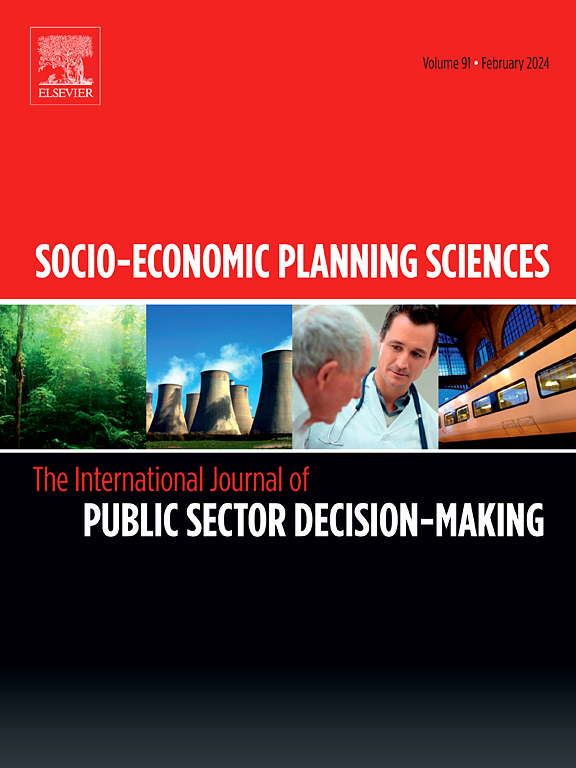混合不确定性下多式联运可持续运输设计的混合优化方法
IF 5.4
2区 经济学
Q1 ECONOMICS
引用次数: 0
摘要
多式联运作为应对气候变化的创新物流解决方案脱颖而出。然而,规划弹性和可持续多式联运货运系统的复杂性需要进一步的研究。为了解决这一关键的研究缺口,本文介绍了一种开创性的混合优化框架,该框架专为设计强大的铁路公路多式联运网络而设计,该网络在导航中断和运营不确定性的同时优先考虑可持续性。该框架采用多周期方法来模拟复杂的多式联运操作,包括模式切换活动。它战略性地确定多式联运终端的最佳位置,并就库存管理和运输计划做出战术决策。目标是提高多式联运终端的可持续性性能,同时最大限度地降低网络的总成本和碳排放。多式联运码头的可持续性评估采用网络数据包络分析的一种变体,考虑了一系列相互冲突的措施。此外,所提出的优化方法集成了p -鲁棒性和可能性机会约束规划,有效地降低了多式联运网络固有的中断风险和运行不确定性。为了验证所提出方法的有效性,使用了两个数据集,包括铁路-公路多式联运货运的真实案例研究。数值结果显示了这种方法的显著好处,表明最大遗憾减少了24%,而预期成本增加了微不足道的1.4%,突出了其可持续和弹性多式联运货运系统的潜力。这项研究为货运公司提供了有价值的见解,以增强对中断的抵御能力和管理运营不确定性,同时也通过减少环境影响为可持续发展的社会目标做出贡献。本文章由计算机程序翻译,如有差异,请以英文原文为准。
A hybrid optimization approach for designing sustainable intermodal freight transport under mixed uncertainty
Intermodal freight transport stands out as an innovative logistics solution for combating climate change. However, the intricacies of planning resilient and sustainable intermodal freight transport systems necessitate further investigation. Addressing this critical research gap, this paper introduces a pioneering hybrid optimization framework tailored for designing a robust rail-road intermodal network that prioritizes sustainability while navigating disruptions and operational uncertainties. This framework adopts a multi-period approach to model intricate intermodal operations, including mode-switching activities. It strategically determines optimal locations for intermodal terminals and makes tactical decisions regarding inventory management and transport planning. The goal is to enhance the sustainability performance of intermodal terminals while simultaneously minimizing the overall total cost and carbon emissions of the network. The sustainability assessment of intermodal terminals employs a variant of network data envelopment analysis, considering a range of conflicting measures. Furthermore, the proposed optimization approach integrates P-robust and possibilistic chance-constraint programming to effectively mitigate disruption risks and operational uncertainties inherent in intermodal networks. To validate the efficacy of the proposed approach, two datasets are utilized, including a real-world case study of rail-road intermodal freight transport. The numerical findings showcase the significant benefits of this approach, demonstrating a remarkable 24 % reduction in maximum regret with a negligible 1.4 % increase in expected cost, highlighting its potential for sustainable and resilient intermodal freight transport systems. This research provides valuable insights for freight transport companies to enhance resilience against disruptions and manage operational uncertainties, while also contributing to societal goals of sustainable development through reduced environmental impacts.
求助全文
通过发布文献求助,成功后即可免费获取论文全文。
去求助
来源期刊

Socio-economic Planning Sciences
OPERATIONS RESEARCH & MANAGEMENT SCIENCE-
CiteScore
9.40
自引率
13.10%
发文量
294
审稿时长
58 days
期刊介绍:
Studies directed toward the more effective utilization of existing resources, e.g. mathematical programming models of health care delivery systems with relevance to more effective program design; systems analysis of fire outbreaks and its relevance to the location of fire stations; statistical analysis of the efficiency of a developing country economy or industry.
Studies relating to the interaction of various segments of society and technology, e.g. the effects of government health policies on the utilization and design of hospital facilities; the relationship between housing density and the demands on public transportation or other service facilities: patterns and implications of urban development and air or water pollution.
Studies devoted to the anticipations of and response to future needs for social, health and other human services, e.g. the relationship between industrial growth and the development of educational resources in affected areas; investigation of future demands for material and child health resources in a developing country; design of effective recycling in an urban setting.
 求助内容:
求助内容: 应助结果提醒方式:
应助结果提醒方式:


